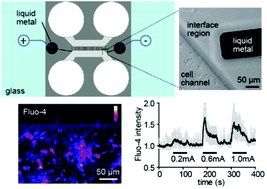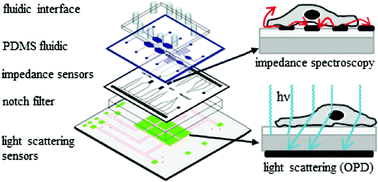Here we have two HOT articles for you to read, both of which are free to access for the next 4 weeks*:
 Researchers at North Carolina State University, USA, integrate microelectrodes into a neuron culture platform creating a single device with which cells can be electrically stimulated and their behaviour recorded simultaneously for scientific experiments. They do this using gallium and its alloys, which are liquid at room temperature and flow into microchannels to create the microelectrodes. This integrated biocompatible device avoids the complication of manually aligning the electrodes and provides subcellular accuracy.
Researchers at North Carolina State University, USA, integrate microelectrodes into a neuron culture platform creating a single device with which cells can be electrically stimulated and their behaviour recorded simultaneously for scientific experiments. They do this using gallium and its alloys, which are liquid at room temperature and flow into microchannels to create the microelectrodes. This integrated biocompatible device avoids the complication of manually aligning the electrodes and provides subcellular accuracy.
Integration of pre-aligned liquid metal electrodes for neural stimulation within a user-friendly microfluidic platform
Nicholas Hallfors, Asif Khan, Michael D. Dickey and Anne Marion
DOI: 10.1039/C2LC40954B
 As featured on the outside front cover of Issue 5, HOT article number two is from a team led by Peter Ertl at the Austrian Institute of Technology, Austria, and Siemens AG, Germany. They combine two methods of cell analysis into one miniaturised device for dual-parameter analysis of cell cultures. The first technique is electrical impedance spectroscopy, normally used in analysing adherent cell cultures. The second is optical light scattering, normally used in flow cytometry. The combination of the two to detect light scattering from adherent cells enables rapid identification of cell number variations during culture, assessment of cell adhesion and interactions in physiological conditions. Applications are envisaged in cell–drug interaction assays and cytotoxicity screening. It also identifies intracellular granularity, which indicates apoptosis.
As featured on the outside front cover of Issue 5, HOT article number two is from a team led by Peter Ertl at the Austrian Institute of Technology, Austria, and Siemens AG, Germany. They combine two methods of cell analysis into one miniaturised device for dual-parameter analysis of cell cultures. The first technique is electrical impedance spectroscopy, normally used in analysing adherent cell cultures. The second is optical light scattering, normally used in flow cytometry. The combination of the two to detect light scattering from adherent cells enables rapid identification of cell number variations during culture, assessment of cell adhesion and interactions in physiological conditions. Applications are envisaged in cell–drug interaction assays and cytotoxicity screening. It also identifies intracellular granularity, which indicates apoptosis.
Standardization of microfluidic cell cultures using integrated organic photodiodes and electrode arrays
Verena Charwat, Michaela Purtscher, Sandro F. Tedde, Oliver Hayden and Peter Ertl
DOI: 10.1039/C2LC40965H
*Free access to individuals is provided through an RSC Publishing personal account. Registration is quick, free and simple










